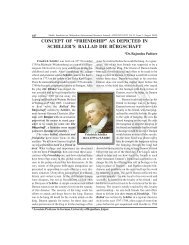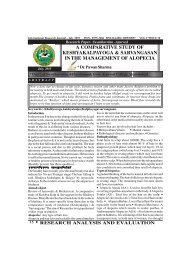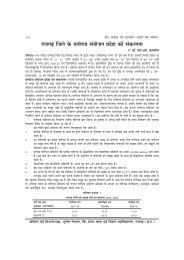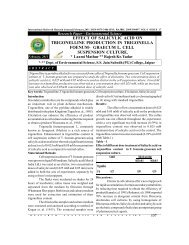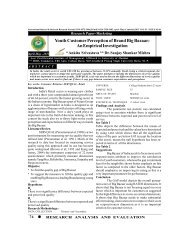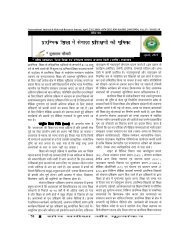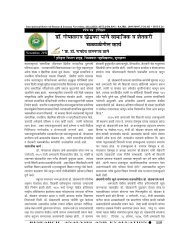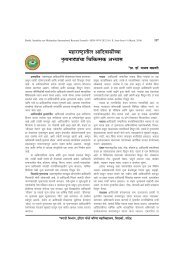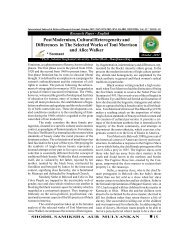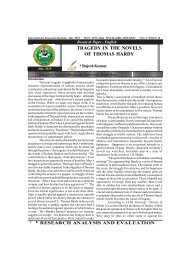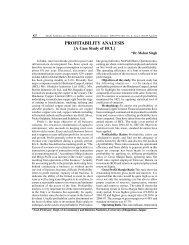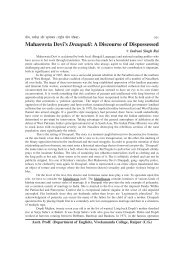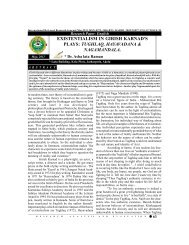Use of Realism in Mulk Raj Anand's Novels - international indexed ...
Use of Realism in Mulk Raj Anand's Novels - international indexed ...
Use of Realism in Mulk Raj Anand's Novels - international indexed ...
Create successful ePaper yourself
Turn your PDF publications into a flip-book with our unique Google optimized e-Paper software.
International Referred Research Journal, January, 2012, ISSN- 0975-3486, RNI : RAJBIL 2009/30097, VOL- III * ISSUE 28<br />
is the prom<strong>in</strong>ent theme and he is concerned with the<br />
suffer<strong>in</strong>gs <strong>of</strong> the masses i.e. Shudra- sweepers and his<br />
wish to br<strong>in</strong>g about social happ<strong>in</strong>ess <strong>in</strong> their lives and<br />
to register his protest aga<strong>in</strong>st the evil <strong>in</strong> the social<br />
system <strong>of</strong> H<strong>in</strong>dus as well, whereas Coolie is about the<br />
new caste system, the economic 'classes' be<strong>in</strong>g so rigid<br />
as to be almost 'closed'. Two Leaves and a Bud represents<br />
the pa<strong>in</strong> <strong>of</strong> poor Indians, who suffer <strong>in</strong> the hands<br />
<strong>of</strong> the British, but the Indian life it represents is based<br />
on the caste and community. Anand wrote these novels<br />
<strong>in</strong> the phase <strong>of</strong> his career when caste system was on the<br />
peak <strong>in</strong> India and he was aware enough to raise his <strong>in</strong><br />
protest. Anand himself accepts:<br />
"From tha time onwards my protest about the human<br />
predicament, under the empire and <strong>in</strong> the atmosphere<br />
<strong>of</strong> our own decay, <strong>of</strong>ten result<strong>in</strong>g from bl<strong>in</strong>d acceptance<br />
<strong>of</strong> bad habits and the taboos <strong>of</strong> the sage Manu<br />
and the Hadith tradition <strong>of</strong> Islam, beceme selfconscious….In<br />
a way I sensed the pa<strong>in</strong> <strong>of</strong> l<strong>of</strong>e, which<br />
the more privileged took out <strong>of</strong> the weaker member <strong>of</strong><br />
the flock"( Anand)<br />
In the realist depiction <strong>of</strong> the Indian<br />
society, he has presented to us a class <strong>of</strong> those people<br />
whose social status is dom<strong>in</strong>ated by their economic<br />
status. In his masterpiece Untouchable the status is<br />
determ<strong>in</strong>ed by birth, whereas <strong>in</strong> one <strong>of</strong> another his<br />
novel Coolie it determ<strong>in</strong>es by an economic group. If<br />
we talk about the theme, Coolie <strong>of</strong> Anand is just extension<br />
<strong>of</strong> Untouchable, Anand depicts the social evil that<br />
has run its impact even <strong>in</strong> Indian history. A strong<br />
believer <strong>in</strong> the dignity and the equality, Anand is naturally<br />
shocked at the <strong>in</strong>human way the untouchables<br />
and coolies are treated by those belong to the superior<br />
caste. Whereas Anand tells about a s<strong>in</strong>gle community<br />
<strong>in</strong> his novel untouchables, but it also implies <strong>in</strong> the rest<br />
<strong>of</strong> the world, where we have caste-based society. Where<br />
we have discrim<strong>in</strong>ation on the name <strong>of</strong> class, race. His<br />
representation <strong>of</strong> social structure reflects his idea to<br />
R E F E R E N C E<br />
revolt aga<strong>in</strong>st for exploitators to change their <strong>in</strong>human<br />
behaviour with the rest <strong>of</strong> the world, and also to<br />
uplift their behaviour <strong>in</strong> the society. In the words <strong>of</strong><br />
K.R.S. Iyenger, his works "not only a representation<br />
<strong>of</strong> social reality, but also a necessary functional part <strong>of</strong><br />
social control, and also, paradoxically, an important<br />
element <strong>in</strong> social change"<br />
<strong>Mulk</strong> <strong>Raj</strong> Anand is the greatest writer<br />
<strong>of</strong> downtrodden because <strong>of</strong> his realistic portrayal <strong>of</strong><br />
Indian society, which <strong>in</strong>cludes the social values and<br />
social harmony. Anand believes that man is the creator<br />
<strong>of</strong> his own dest<strong>in</strong>y. He has immense faith <strong>in</strong> man and<br />
his power. Be<strong>in</strong>g a great artist, Anand does speak about<br />
black and white, but he gives the artistic form to the<br />
tragic experience <strong>of</strong> a man. <strong>Anand's</strong> revolt and warn<strong>in</strong>g<br />
lies with<strong>in</strong> the presentation <strong>of</strong> his art. About the<br />
novels <strong>of</strong> Anand, Iyanger says that they came "fresh<br />
from contact with flesh and blood <strong>of</strong> everyday existence".<br />
We f<strong>in</strong>d no discrim<strong>in</strong>ation based on race and<br />
caste <strong>in</strong> our constitution, but <strong>in</strong> practical life these all<br />
aspects still exist <strong>in</strong> our society. Social discrim<strong>in</strong>ation<br />
still prevails this way or that way and, therefore, social<br />
exclusion and exploitation <strong>of</strong> the lower class <strong>of</strong> the<br />
society, though their form and proportion might be<br />
different from the cases <strong>of</strong> pre-<strong>in</strong>dependence era. K.R<br />
Shr<strong>in</strong>ivas Iyenger also confirms this, "….the problem<br />
with blunted edges, perhaps, and also with some reliev<strong>in</strong>g<br />
features here- still defies a firm and f<strong>in</strong>al solution!"<br />
Despite <strong>of</strong> that <strong>Anand's</strong> novels considered as the<br />
blend to change the social system so that the untouchables<br />
can enjoy the equal freedom <strong>in</strong> the society. Anand<br />
dreamt for our strong, united, prosperous and peaceful<br />
nation. Through his great works he has presented to us<br />
the pa<strong>in</strong>ful realistic picture <strong>of</strong> our so called Indian<br />
society <strong>in</strong> a great manner, now he has left on us to th<strong>in</strong>k<br />
how we can change the prevail<strong>in</strong>g system, and how<br />
can we make our nation more prgressive.<br />
<strong>Mulk</strong> <strong>Raj</strong> Anand, Untouchable, New Delhi: Orient Paperbacks, 1970 <strong>Mulk</strong> <strong>Raj</strong> Anand, "The Source <strong>of</strong> Protest <strong>in</strong> my <strong>Novels</strong>" <strong>in</strong> The Indian<br />
Novel with a Social Purpose ed. By K. Venkata Reddy, New Delhi: Atlantic Publishers and Distributors, 1999, pp. 20-21 K.R.S. Iyenger, Indian<br />
Writ<strong>in</strong>g <strong>in</strong> English, New Delhi: Sterl<strong>in</strong>g Publishers, 1984, p.338-39. <strong>Mulk</strong> <strong>Raj</strong> Anand, "The Source <strong>of</strong> Protest <strong>in</strong> my <strong>Novels</strong>", op. cit., p.29<br />
<strong>Mulk</strong> <strong>Raj</strong> Anand: Coolie. 1936. London: Pengu<strong>in</strong>, 1986 Saroj Cowasjee: Author and critic: The letter <strong>of</strong> <strong>Mulk</strong> <strong>Raj</strong> Anand (Writers Workshop<br />
Publication).<br />
RESEARCH ANALYSIS AND EVALUATION 101



